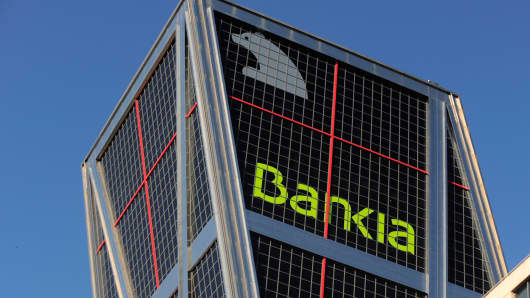Shares in state-owned Spanish lender Bankia tumbled on Tuesday after billions of new shares flooded the market as part of a multi-billion euro cash injection, with little hope of a quick recovery amid tough business conditions.
More than 11 billion shares issued as part of a 15.5 billion euro ($20 billion) recapitalisation of the bank started trading at 8:00 a.m. London time, in what was meant to be a new beginning after a 24 billion euro bailout last year which eventually triggered a European rescue of Spain's financial system.
The stock is likely to remain under pressure as the bank, now Spain's fourth-biggest by market capitalisation, faces mounting challenges to implement its restructuring plan.
Analysts predict the shares could settle at a price ranging from 0.40 euro to 0.60 euro, below the initial trading price of 0.6 euro, the 1.35 euros at which they were issued and their book value of 1 euro.
At 8:10 a.m. London time, the shares were down 8.67 percent at 0.548 euros following an initial slump of 20 percent at the open. Spain's blue-chip index Ibex was up 1.47 percent with Bankia's peers rebounding sharply from last week's losses.
Bankia, formed from the merger of seven former regional savings banks, has lost 99 percent of its value on the stock exchange since its listing in July 2011.
It became the symbol of Spanish banks' woes last year, accounting for the bulk of the 42-billion-euro European rescue Spain sought to prop up lenders brought low after a decade-long property bubble burst in 2008.
Its troubles have caused widespread outrage in Spain as hundreds of thousands of small savers, often retired people with little or no knowledge of finance, lost their money by investing in the bank when it was floated or by buying complex debt products that it sold between 2007 and 2009.
Many of those debt products are now being converted to shares as part of the latest restructuring designed to clean up its balance sheet.
Spain's bank restructuring fund, which owns 68.4 percent of the bank and had said it could increase its stake by another 1.6 percent, did not buy any stock on Tuesday, a source said.
(Read More: Bankia Shareholders Face Big Losses After Negative Valuation)
About 3 percent of the free float of 31.6 percent had changed hands by 10 a.m. London time.
Most of it is owned by former holders of preference shares and hybrid debt, often small savers who were mis-sold these complex financial instruments and were forced to swap them at discounts for ordinary shares.
Many were expected to sell these new shares on Tuesday to try to recoup part of their money, adding downward pressure to a stock which lost more than 50 percent of its value last week when institutional investors triggered a mass sell-off as they received their shares.
Following the up to 70 percent discount on the swap from debt products to ordinary shares and last week's slump in the stock, some savers have now lost as much as 88 percent on their initial investment according to Reuters calculations.
"They're cheating us again, like they did before," said Maricarmen Olivares, whose parents invested in preference shares and lost 600,000 euros life savings made from selling her father's car workshop.
She said she had not sold her new shares and had opened a lawsuit instead of going for an arbitration process to get her money back.
"Everything is a swindle - the share listing, the compensation package, the value of the stock now. We don't understand what they are trying to do with us.
I've left it in the lawyer's hands and I don't even want to know about Bankia," she also said.
Between 200 and 300 people who lost money after investing in these complex debt instruments staged protests outside the congress on Tuesday morning.
More Pain Ahead
Further pressure will come from a recession which economists expect to last at least another two quarters.
The bank also needs to pay back public aid and cheap European Central Bank loans received last year and faces a possible new round of provisioning to cover losses on the refinanced loans portfolios.
Prospects for the bank are also clouded by uncertainty over government plans for handling state-owned banks and potential risks from arbitration over the mis-selling, which it could have to settle in cash.
"It is difficult to calculate a fair value for a nationalised company involved in such an in-depth restructuring process but we do not think the bank will be able to obtain returns in line with the cost of capital (even after the restructuring process) in the coming years," said Exane BNP Paribas analyst Santiago Lopez Diaz in a note on Tuesday.
(Read More: These 2 Things Are Missing on Spain's Route to Recovery)
He assigns a price target of 0.4 euros to the stock.
Bankia Chairman Jose Ignacio Goirigolzarri remains positive, saying last week the stock price should eventually settle at around 0.7 to 0.8 euros, a valuation in line with those of Spanish peers which all have a share price of between 0.7 to 0.8 times their book value.
Bankia should benefit from the clean-up of its property business, a strategy to sell non-core assets and a likely comeback within Spain's blue-chip IBEX 35 index.
The lender agreed on Friday to sell City National Bank of Florida to Chilean bank BCI <BCI.SN> for $883 million, booking 180 million euros of net capital gains and generating 30 basis points of core capital.
It could also raise several billion euros from the sale of stakes in air carrier International Airlines Group, Spanish utility Iberdrola and Spain's biggest insurer Mapfre.


